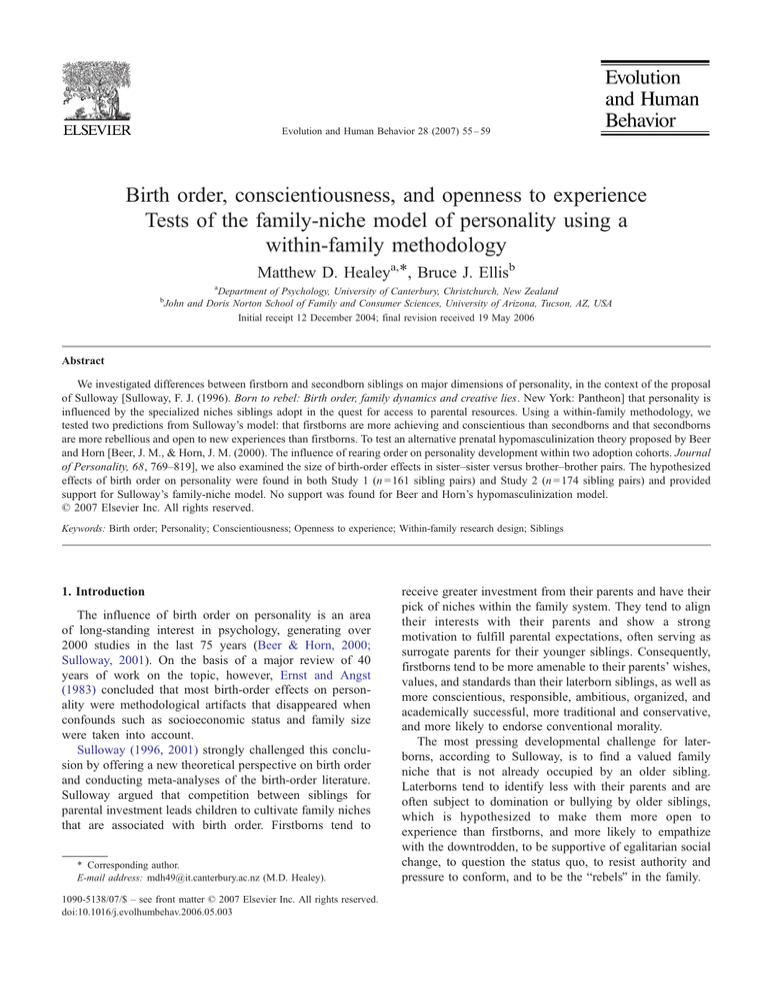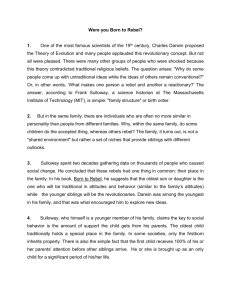
Evolution and Human Behavior 28 (2007) 55 – 59
Birth order, conscientiousness, and openness to experience
Tests of the family-niche model of personality using a
within-family methodology
Matthew D. Healeya,4, Bruce J. Ellisb
a
b
Department of Psychology, University of Canterbury, Christchurch, New Zealand
John and Doris Norton School of Family and Consumer Sciences, University of Arizona, Tucson, AZ, USA
Initial receipt 12 December 2004; final revision received 19 May 2006
Abstract
We investigated differences between firstborn and secondborn siblings on major dimensions of personality, in the context of the proposal
of Sulloway [Sulloway, F. J. (1996). Born to rebel: Birth order, family dynamics and creative lies. New York: Pantheon] that personality is
influenced by the specialized niches siblings adopt in the quest for access to parental resources. Using a within-family methodology, we
tested two predictions from Sulloway’s model: that firstborns are more achieving and conscientious than secondborns and that secondborns
are more rebellious and open to new experiences than firstborns. To test an alternative prenatal hypomasculinization theory proposed by Beer
and Horn [Beer, J. M., & Horn, J. M. (2000). The influence of rearing order on personality development within two adoption cohorts. Journal
of Personality, 68, 769–819], we also examined the size of birth-order effects in sister–sister versus brother–brother pairs. The hypothesized
effects of birth order on personality were found in both Study 1 (n = 161 sibling pairs) and Study 2 (n = 174 sibling pairs) and provided
support for Sulloway’s family-niche model. No support was found for Beer and Horn’s hypomasculinization model.
D 2007 Elsevier Inc. All rights reserved.
Keywords: Birth order; Personality; Conscientiousness; Openness to experience; Within-family research design; Siblings
1. Introduction
The influence of birth order on personality is an area
of long-standing interest in psychology, generating over
2000 studies in the last 75 years (Beer & Horn, 2000;
Sulloway, 2001). On the basis of a major review of 40
years of work on the topic, however, Ernst and Angst
(1983) concluded that most birth-order effects on personality were methodological artifacts that disappeared when
confounds such as socioeconomic status and family size
were taken into account.
Sulloway (1996, 2001) strongly challenged this conclusion by offering a new theoretical perspective on birth order
and conducting meta-analyses of the birth-order literature.
Sulloway argued that competition between siblings for
parental investment leads children to cultivate family niches
that are associated with birth order. Firstborns tend to
4 Corresponding author.
E-mail address: mdh49@it.canterbury.ac.nz (M.D. Healey).
1090-5138/07/$ – see front matter D 2007 Elsevier Inc. All rights reserved.
doi:10.1016/j.evolhumbehav.2006.05.003
receive greater investment from their parents and have their
pick of niches within the family system. They tend to align
their interests with their parents and show a strong
motivation to fulfill parental expectations, often serving as
surrogate parents for their younger siblings. Consequently,
firstborns tend to be more amenable to their parents’ wishes,
values, and standards than their laterborn siblings, as well as
more conscientious, responsible, ambitious, organized, and
academically successful, more traditional and conservative,
and more likely to endorse conventional morality.
The most pressing developmental challenge for laterborns, according to Sulloway, is to find a valued family
niche that is not already occupied by an older sibling.
Laterborns tend to identify less with their parents and are
often subject to domination or bullying by older siblings,
which is hypothesized to make them more open to
experience than firstborns, and more likely to empathize
with the downtrodden, to be supportive of egalitarian social
change, to question the status quo, to resist authority and
pressure to conform, and to be the brebelsQ in the family.






